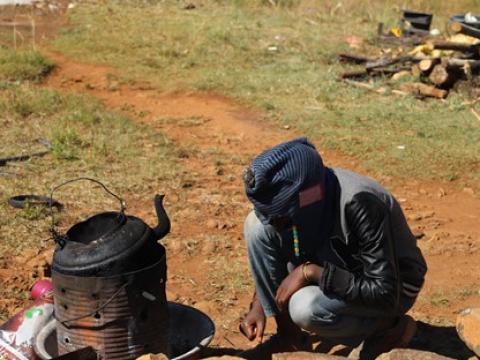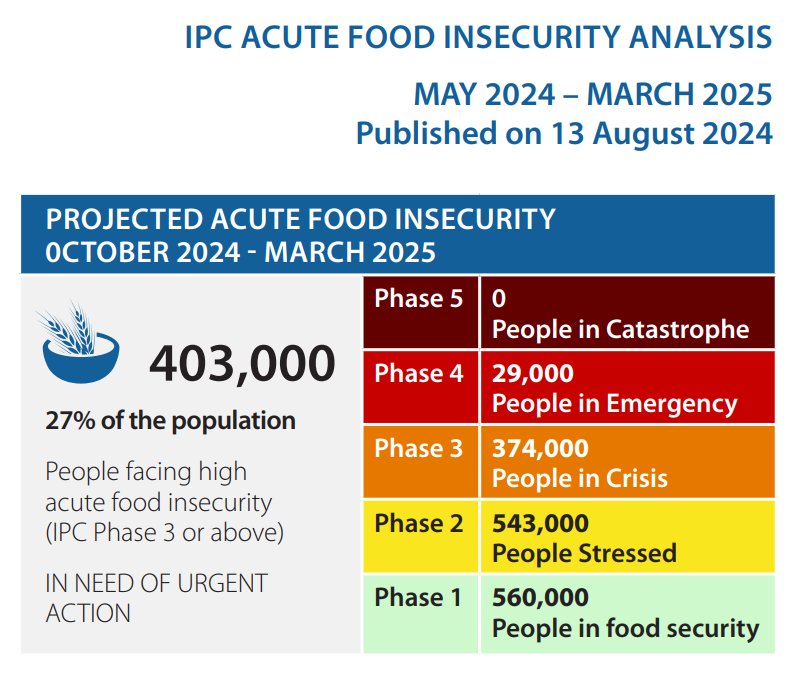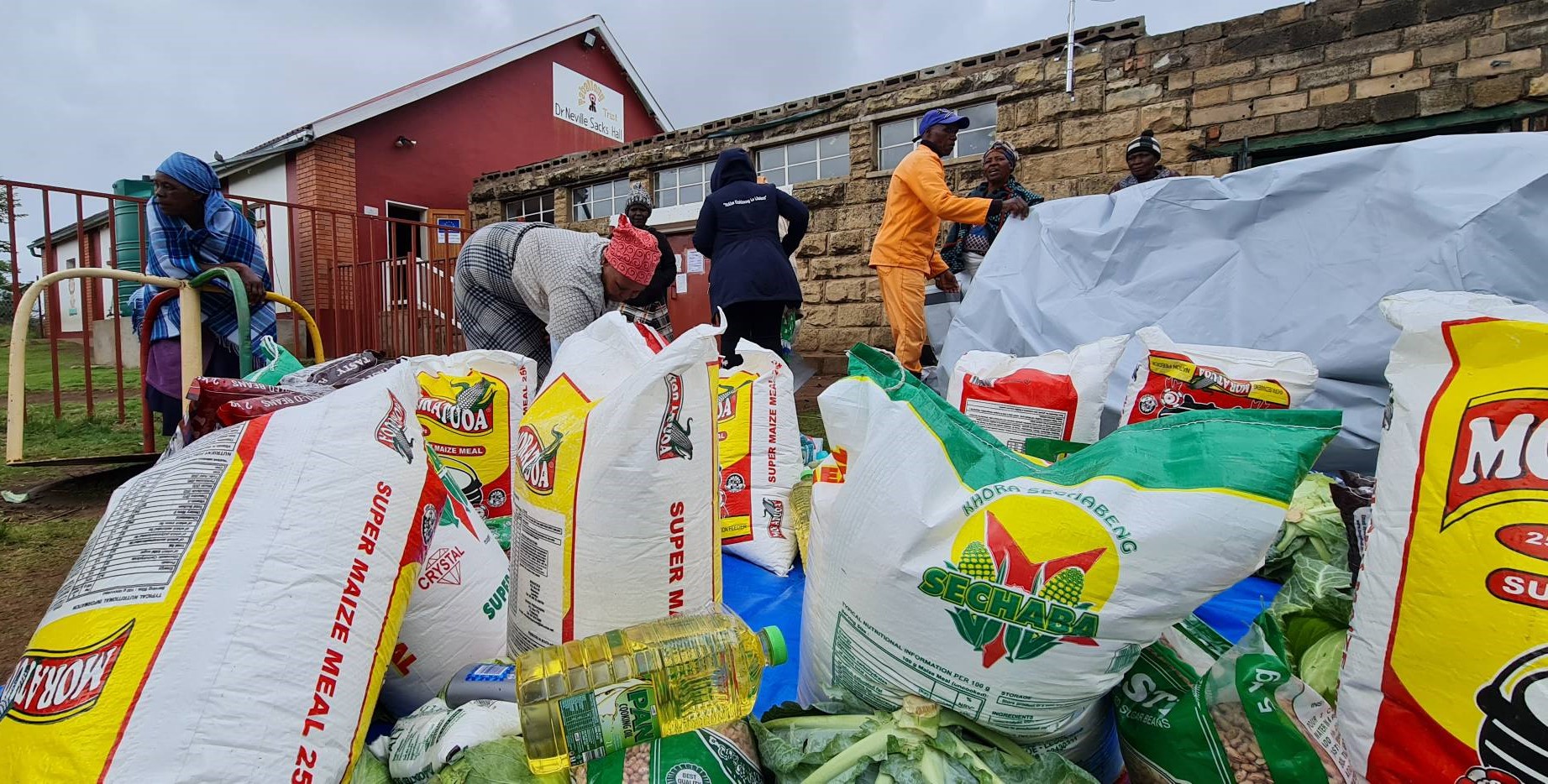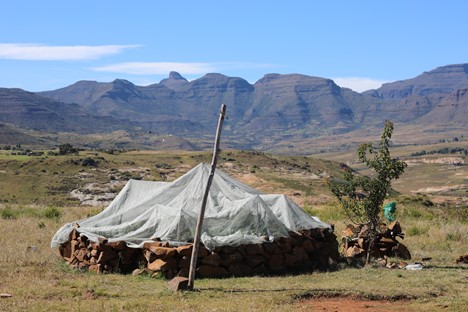10 Districts of Lesotho Under Food Crisis: World Vision Lesotho and ECHO Step Up to Tackle Hunger and Save Lives

As climate change continues to prevail, communities in Lesotho are facing conditions of despair. Seasonal patterns that were once predictable have drastically altered. The country currently experiences very cold winters and increasingly dry summers, leading to prolonged drought conditions and significant soil moisture loss. These climate impacts have intensified the El Niño-induced drought, which has crippled agriculture and left communities more vulnerable to hunger especially in children. Taking into account that Lesotho relies heavily on crop production for food security, these climatic uncertainties pose critical challenges to access of food and livelihoods.

According to the Lesotho Vulnerability Assessment Committee report published in 2024, titled Lesotho Acute Food Insecurity Analysis, the Integrated Phase Classification (IPC) results projected acute food insecurity classified as IPC 3, which will affect seven districts and approximately 19% of the rural population. This amounts to about 293,000 Basotho from poor and very poor households in rural areas. The IPC 3 classification indicates that this population requires urgent action to address food shortages, protect and restore livelihoods, and prevent high rates of acute malnutrition. Children, especially those under five, are particularly at risk, as food shortages can quickly lead to stunted growth and weakened immune systems, making them more susceptible to illnesses.
The report further indicates a concerning increase in food shortages, predicting that an alarming 27% of the rural population will suffer from food insecurity during the period from October 2024 to March 2025. During this timeframe, around 403,000 Basotho living in ten districts are projected to fall under IPC 3, highlighting the widespread nature of food insecurity in the country. The main hazards anticipated during this period include La Niña-induced climatic conditions and price hikes, both of which are likely to adversely affect food access and utilization for many families. With rising food prices, poor households, particularly those with children, are forced to rely on less nutritious, cheaper food options, contributing to malnutrition in children and weakening their ability to thrive and develop.
This situation calls for intensified interventions from both the government and development partners to mitigate the impending hunger resulting from the ongoing food crisis. Hunger is not only about food shortages but also about ensuring that vulnerable populations, particularly children, receive nutritious food that supports their growth and health. Malnutrition is a silent killer that disproportionately affects young children, contributing to developmental delays and sometimes even mortality if not addressed promptly.

In response, the World Vision Lesotho project ‘Consolidating and Strengthening Disaster Risk Reduction capacities in Lesotho, funded by the European Civil Protection Humanitarian Aid Operations will distribute food packages to 242 households in 60 villages rated the most vulnerable in the project implementation districts: Maseru, Thaba-Tseka, Leribe and Mokhotlong, for a duration of three months starting from October 2024 until December 2024. This step aims at ensuring that the nutritional needs of affected communities are met during this challenging time. These food packages include maize meal, fruit and vegetables, beans, cooking oil, salt, bread flour, milk, fish and are designed not only to meet the immediate hunger needs of these households but also to provide nutrient-rich food that is critical to preventing malnutrition in children. Each package is carefully curated to provide necessary proteins, carbohydrates and vitamins that are essential for human development and health. The package also consists of hygiene items such as sanitary towels, soap, roll on, toothpaste and bathing towels, for improved hygiene.
The food crisis response primary objective is to alleviate human suffering, decrease hunger, protect people from the harmful impacts of malnutrition, and sustain livelihoods through targeted assistance. This equally aims to reduce the risk of possible disasters emanating from food insecurity, malnutrition or hunger. This includes short-term emergency relief through food distribution and long- term capacity building to improve food security. By ensuring that families receive adequate, nutritious food, the response seeks to prevent acute malnutrition and its long-term impacts on children's cognitive and physical development.

The ‘Consolidating and Strengthening Disaster Risk Reduction capacities in Lesotho project response goes beyond immediate relief. As the report further urges a multifaceted approach that combines immediate relief efforts with long-term strategies is needed to enhance food production and access for vulnerable households. To achieve these beneficiaries will also be capacitated with disaster risk reduction techniques and means to improve household level crop production for sustained livelihoods. The long-term goal is to build resilience among these communities, ensuring that future droughts or food crises do not leave families, especially children, vulnerable to hunger.
World Vision is deeply committed to ending hunger in Lesotho and ensuring that no child goes to bed hungry. Through this project and others like it, we are working tirelessly to bring immediate relief to families during this food crisis while also empowering communities with the knowledge and tools they need to ensure food security for the future. Our efforts are centered on children and their well-being, ensuring that even during crises, they have access to nutritious food, which is vital for their health and future.
This crisis demands a collaborative response from all stakeholders to ensure that vulnerable Basotho, particularly children, are supported through these challenging times. By putting nutritious food on the table for families, we are not just meeting a basic need but investing in the health, growth, and future of Lesotho's children.